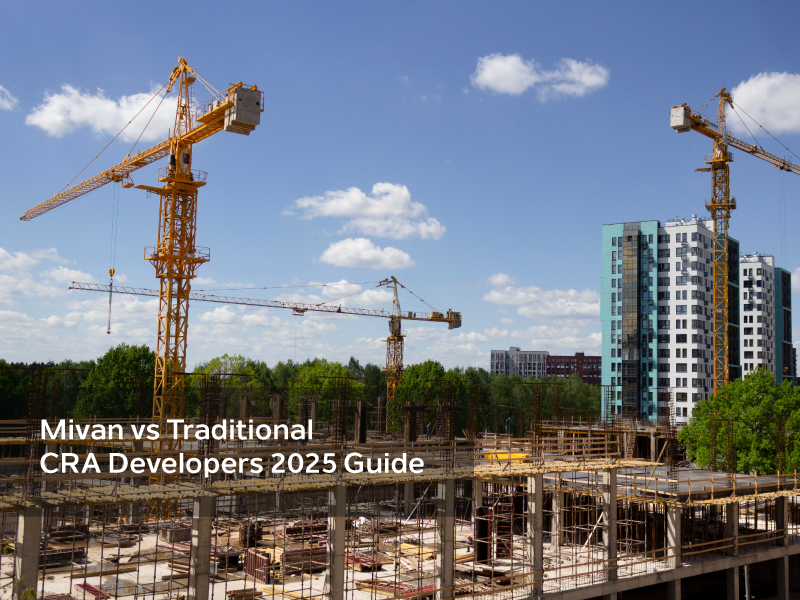If you’ve been exploring apartments or new housing projects lately, chances are you’ve come across the term Mivan Construction. Maybe you even wondered—what makes it different from the traditional brick-and-mortar way we’ve known for years?
You’re not alone. Many homebuyers in 2025 are asking the same thing. The real estate market is changing fast, and builders like CRA Developers are at the forefront of adopting new construction technologies to create stronger, smarter, and faster-built homes.
But the big question still stands: Is Mivan Construction really better, or is the traditional method still the safer choice? Let’s dive in and find out.
Understanding Mivan Construction
To put it simply, Mivan Construction is a modern aluminum formwork system originally developed in Europe. It uses large, precisely crafted aluminum panels to pour concrete for walls, floors, and columns all at once—creating a single, solid structure.
Unlike the usual process where brick walls are built piece by piece, Mivan Construction uses pre-engineered formwork, which makes the structure uniform and extremely durable.
How It Works (In Simple Words)
Aluminum panels are assembled to form the shape of the building’s walls and slabs.
Reinforcement steel is placed inside.
Concrete is poured into the entire setup.
Once the concrete hardens, the formwork is removed, leaving behind a smooth and solid finish.
It’s like creating the skeleton of the entire building in one go, without all the bricklaying and plastering delays.
Bonus: Mivan Construction: The Proven Method for Faster, Stronger, and Smarter Buildings
What Is the Traditional Construction Method?
Before we move too fast, let’s not forget the roots. Traditional construction, also known as the conventional method, is what we’ve seen for decades—brick walls, plaster, and manual workmanship.
Here’s what usually happens:
The structure (columns and beams) is made first.
Then, walls are built using bricks or concrete blocks.
Plastering, curing, and finishing follow next.
This method relies heavily on labor skill, material consistency, and time. It’s flexible for design changes, but slower and sometimes less precise.
Many builders still prefer it because of its familiarity and ease of small repairs. But in big residential projects, speed and precision matter a lot—and that’s where Mivan Construction begins to shine.
Mivan Construction vs Traditional Method: Key Differences
Let’s break this down in a simple comparison.
| Feature | Mivan Construction | Traditional Method |
|---|---|---|
| Speed | Much faster – large areas built simultaneously | Slower – bricklaying and plastering take time |
| Durability | Monolithic concrete structure – highly durable | Dependent on workmanship and materials |
| Finish Quality | Smooth, uniform walls (less plaster needed) | Needs plastering and finishing |
| Cost | Slightly higher upfront, but lower maintenance | Lower initial cost, but higher maintenance later |
| Flexibility | Limited design change once cast | Easier to modify mid-way |
| Strength | Excellent resistance to earthquake and weather | Moderate depending on materials used |
In short, Mivan Construction is all about precision, strength, and time-saving, while the traditional method is about flexibility and cost control.
Why CRA Developers Trust Mivan Construction
When you talk to the team at CRA Developers, one thing becomes clear—they believe in long-term quality. Over the years, their projects have evolved from standard methods to advanced technologies that ensure faster delivery without compromising durability.
For instance, CRA Developers use Mivan Construction in select residential projects because it helps them:
Deliver homes faster to their clients
Achieve perfect alignment and finish
Reduce maintenance issues for homeowners
Create buildings that last for decades, not just years
Their approach isn’t about following trends—it’s about ensuring that every family gets a home built on trust, precision, and solid engineering.
Pros and Cons of Both Methods
Every method has its pros and cons, and the same goes for Mivan Construction and the traditional approach.
Mivan Construction Pros
Extremely durable and earthquake-resistant
Faster completion times (saves months)
Consistent quality and smooth finish
Better space utilization
Low maintenance over time
Mivan Construction Cons
High initial cost for setup
Difficult to modify structure once done
Requires skilled workforce
Traditional Construction Pros
Flexible design—changes possible mid-way
Lower initial investment
Materials easily available
Traditional Construction Cons
More prone to cracks and leakage
Slower progress and uneven quality
Higher long-term maintenance costs
So, while the traditional route may feel more familiar, Mivan Construction offers long-term advantages that are hard to ignore—especially when led by experts like CRA Developers.
Bonus: Smart Home Technologies That Are Boosting Property Demand
Cost Comparison: Mivan vs Traditional
One of the first questions people ask is—does Mivan Construction cost more?
Yes and no.
Initially, Mivan Construction does come with higher setup costs due to the aluminum formwork and technical requirements. But it saves money in the long run because:
Less material wastage
Minimal rework or repair
Lower maintenance over years
Faster project delivery (saves financing costs for developers)
So, while traditional construction might appear cheaper upfront, the total lifetime cost of a Mivan-built home often turns out to be lower.
When CRA Developers use Mivan Construction, they ensure cost efficiency through careful planning and bulk material management—so buyers get premium quality without unnecessary price hikes.
Which One Is Better for Homebuyers in 2025?
Now here’s where it gets interesting. The answer depends on you, the buyer.
Let’s imagine two people—
Rohan, a young IT professional who wants a ready-to-move-in apartment, and Mr. Mehta, a retired teacher who’s constructing his dream home on a plot.
For Rohan, Mivan Construction by CRA Developers is perfect. He gets a home that’s delivered on time, built to perfection, with zero maintenance headache.
But for Mr. Mehta, who enjoys tweaking his home design as he goes, traditional construction might be better.
In 2025, though, urban buyers prefer reliability and structural integrity. The pace of life is fast, and so are their expectations. That’s why Mivan-built apartments are in demand—they align perfectly with modern homebuyers’ lifestyles.
CRA Developers’ Expert Opinion
When you speak to experienced builders like CRA Developers, they’ll tell you one simple thing: “Quality construction is not just about materials, it’s about method.”
CRA Developers have witnessed firsthand how Mivan Construction transformed the way large-scale residential projects are executed. The speed, precision, and durability it offers make it a preferred choice, especially for metropolitan cities like Delhi NCR where timelines and quality go hand in hand.
Their use of Mivan Construction in select projects shows their commitment to bringing world-class building practices to Indian homebuyers—without cutting corners.
They understand that a home is not just an asset; it’s an emotion, a lifelong investment. And for that, Mivan Construction provides the kind of assurance traditional methods often struggle to match.
Bonus: 4 BHK Apartments in Rohini: Why Smart Buyers Are Choosing Space Over Stress
Final Thoughts
So, Mivan Construction vs Traditional Method—which is right for you in 2025?
If you value precision, strength, and on-time delivery, Mivan Construction wins hands down. If you prefer flexibility and are building a small customized home, the traditional way still works fine.
But as urban life evolves and expectations rise, builders like CRA Developers are proving that adopting modern methods is not just about speed—it’s about trust, sustainability, and delivering homes that truly stand the test of time.
In the end, it’s not only about how a building looks; it’s about how it lives. And in that sense, Mivan Construction is more than a method—it’s the future of smart, secure, and enduring homes.

